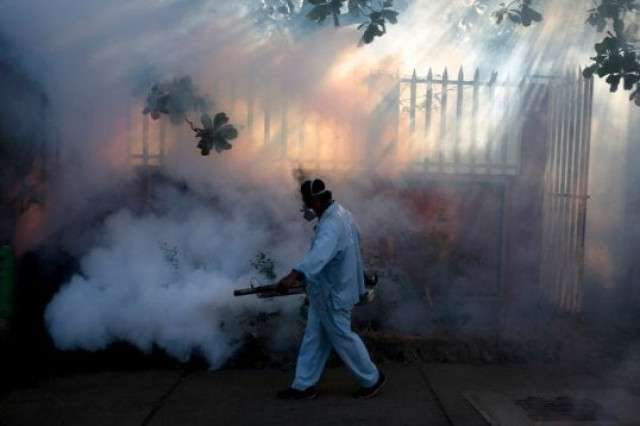Fighting mosquito-borne diseases in Sindh: 'Fumigation campaign to start July 1'
Dengue Prevention and Control Programme holds awareness workshop for media

Case-specific fumigation is in the domain of the programme while general fumigation is the responsibility of the municipal corporations. PHOTO: REUTERS
This was stated by the programme manager of the Dengue Prevention and Control Programme, Dr Masood Solangi, while sharing an emergency action plan to fight the spread of mosquito-borne diseases in the province. He was speaking during a workshop organised for media personnel at the office of the Dengue Prevention and Control Programme.
According to him, the final plan has been submitted to the chief minister for the special allocation of Rs50 million to pay for the cost of fuel and chemicals.
Dengue returns with a vengeance
The reported number of deaths from dengue since a major outbreak of the disease in 2010 has been 98 and the total reported cases have been 22,000, which is just the tip of the iceberg, claimed Dr Shahana Kazmi, a professor at the Dadabhoy Institute of Higher Education.
Although awareness regarding the diagnosis, prevention and treatment of dengue has been carried out, achieving control of the vector remains a big dream of the government, she said.
No serious efforts have been made to carry out fumigation and larvacidal activities in order to eradicate the vector, she said.
The Dengue Prevention and Control Programme was established in August, 2015, after a major outbreak of the disease in 2010 that claimed more than 40 lives in the province. The programme is still limited to surveillance activity and has not entered the operational stage as the recruitment process is still in process for final approval.
Chikungunya engulfs coastal belt of Karachi
Early diagnosis is key for reducing the number of deaths caused due to viral mosquito-borne diseases, Solangi said.
Case-specific fumigation is in the domain of the programme while general fumigation is the responsibility of the municipal corporations, Solangi said. "In case-specific fumigation, 40 houses, 10 from each side of the [road], have to be fumigated by the programme," he added.
As many as 3,247 cases of chikungunya have been reported until now since its outbreak on December 19 in Saudabad last year when 100 new cases were reported in a single day. However, Solangi said that some of the major hospitals in the city, such as South City Hospital and National Medical Centre and many neighbourhood clinics, do not share their data and this creates issues in evolving the right strategy against eradication of the disease.
Prevention of Chikungunya
If no efforts are made to eradicate the breeding grounds of these mosquitos, then the threat of the emergence of the Zika virus and yellow fever will increase, Dr Solangi said, adding that the vector control strategies recommended by WHO, such as environmental and chemical management, need to be adopted to wipe out the breeding grounds.
The clinical diagnosis is high grade fever and severe pain and the only treatment available is symptomatic treatment since all viral diseases are self-limiting, Dengue Prevention and Control Programme Additional Programme Manager Dr Qamar Abbas said.
Solangi said the KMC, district health officers and others responsible for the prevention and control of these diseases in the province, do not play their role.


















COMMENTS
Comments are moderated and generally will be posted if they are on-topic and not abusive.
For more information, please see our Comments FAQ